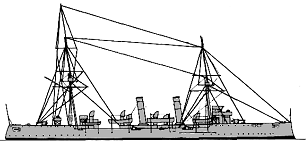
PIONEER protected cruisers (1900/1912-1915)

Pioneer 1912
| Name | No | Yard No | Builder | Laid down | Launched | Comp | Fate |
| Pioneer | Chatham DYd, UK | 16.12.1897 | 28.6.1899 | 11/1900 // 12.1912 | hulk 1924 | ||
| Psyche | Devonport DYd, UK | 11/1897 | 19.7.1898 | 1900 // 7.1915 | sold for BU 6.1922 |
|
Displacement normal, t |
|
|
Displacement full, t |
2135 - 2200 |
|
Length, m |
91.4 pp 95.6 oa |
|
Breadth, m |
11.1 |
|
Draught, m |
4.88 |
|
No of shafts |
2 |
|
Machinery |
2 3-cyl. VTE, 16 Thornycroft boilers |
|
Power, h. p. |
7000 |
|
Max speed, kts |
20 |
|
Fuel, t |
coal 500 |
| Endurance, nm(kts) | 5500(10) |
| Armour, mm |
steel; deck: 51 - 38, gun shields: 6, CT: 76 |
|
Armament |
8 x 1 - 102/40 QF Mk I/III, 8 x 1 - 47/40 3pdr Hotchkiss Mk I, 3 õ 1 - 7.7/94, 2 - 450 TT (beam, aw) |
|
Complement |
224 |
Project history: The Pelorus class were
very similar in appearance and general arrangement to the earlier Pearl
class but were slightly smaller, with a lighter armament, and demonstrated a
different approach to the problem of obtaining high speed. They had more
powerful machinery that the the earlier class with a natural draught power of
5000ihp compared with 4000ihp, but forced draught power was restricted to a
realistic 7000ihp which was 500ihp less than that in Pearl and her
sisters. In order, therefore, to provide for the high designed speed of 20kts
they were made longer and narrower than the Pearls, with a length to beam
ratio of 8.2:1 compared with 6.5:1. The narrower beam also meant a reduction in
the level of stability and although their lighter armament compensated for this
to some extent, they proved to be poor sea boats, having a heavy roll and being
very wet in heavy weather.
Apart from the substitution of 102mm QFs for 120mm QFs, the
gun armament was identical to that in the Pearl class and was disposed in
the same manner.
They were fitted with a variety of boilers to test the
qualities of some of the many water tube types available. The results were
varied and, while most of the class exceeded their designed power, making
between 20 and 21kts on trial, they all suffered from a certain amount of boiler
trouble and after a few years' service average maximum speeds were around
16-17kts. The least successful were Pomone and Pactolus, whose
Blechynden boilers were so troublesome that the ships were removed from the
effective list after only a few years' service.
Ship protection: Main deck has 38-32mm flat part and 51-44mm slopes. Thicker part was over machinery.
Modernizations: None.
Naval service: No significant events.
© Ivan Gogin, 2015